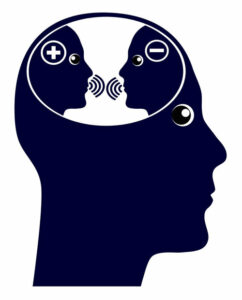Bipolar disorder is a serious mental health condition that can have a profoundly negative impact on someone’s life. It usually involves swings in mood between extreme highs and lows, making it difficult to regulate emotions and lead a normal life. Fortunately, there is help available for those experiencing bipolar disorder, including cognitive-behavioral therapy (CBT). In this blog post, we will explore the different techniques used in CBT for bipolar disorder and how it works to help those affected by the condition. We will also discuss the benefits of CBT.
Contents
CBT for Bipolar Disorder: An Overview

CBT for bipolar disorder is a type of psychotherapy that can help people manage their condition. The goal of CBT is to help people change their thinking and behavior patterns to improve their mood and functioning.
CBT typically involves helping people identify and challenge negative thoughts and beliefs, as well as teaching them healthy coping and problem-solving skills. Also, CBT can be an effective treatment for bipolar disorder, and it may be used alone or in combination with other treatments, such as medication.
CBT is based on the idea that our thoughts, feelings, and behaviors are interconnected. When we experience challenging emotions or life events, it can lead to negative thought patterns and unhealthy behavior. CBT helps people recognize these patterns and learn how to reframe them in more positive ways. This can help reduce symptoms of bipolar disorder, such as depressive episodes and manic episodes.
Core Techniques Used in CBT for BD
Several different techniques can be used in CBT for bipolar disorder, and the therapist will tailor the approach to the individual patient. However, some core techniques are often used.
Cognitive Restructuring

One main focus of CBT for bipolar disorder is helping the patient to identify and challenge any irrational or distorted thoughts that are related to their symptoms. This technique, known as cognitive restructuring, helps them to become aware of how their thinking may be influencing their behavior and emotions negatively.
One helpful exercise is to create a Thought Record, where the patient records their thoughts and feelings in response to a specific situation. This can help them to identify any irrational or distorted thinking and challenge it with more realistic and helpful ideas.
Behavioral Activation
Another important component of CBT for bipolar disorder is helping the patient to engage in meaningful and enjoyable activities, known as behavioral activation. This can be particularly helpful in preventing depressive episodes, as patients may be less likely to engage in activities when they are feeling down.
Behavioral activation involves setting goals and planning activities that the patient enjoys and finding ways to make these activities more accessible. For example, if a patient loves painting but hasn’t done it in a while, the therapist can help them to find supplies and create an action plan for painting regularly.
Problem-Solving Skills
Cognitive behavioral therapy also focuses on teaching problem-solving skills that will help patients cope with difficult situations. The therapist may use role-playing or other exercises to practice different ways of responding.
The therapist may help the patient to brainstorm different solutions and asses which ones are most likely to work in a particular situation. They can also practice problem-solving skills so that they can use them when faced with stressful or difficult situations in the future.
Relaxation Techniques

Finally, relaxation techniques such as deep breathing, progressive muscle relaxation, and mindfulness meditation can be used as part of CBT for bipolar disorder. These techniques can help to reduce symptoms of anxiety and depression by calming the mind and body.
The therapist may guide how to practice these techniques at home or in other settings so that the patient can use them whenever they need to.
How Does CBT Work for BD?
Cognitive behavioral therapy (CBT) is a type of psychotherapy that helps people change their thinking and behavior. CBT is based on the idea that our thoughts, feelings, and behaviors are all interconnected. One way CBT can help people with bipolar disorder is by helping them to identify and change negative thinking patterns and behaviors that may be making their symptoms worse.
CBT usually consists of weekly sessions lasting for 60-90 minutes. During CBT sessions, people with bipolar disorder work with a therapist to identify negative thought patterns and behaviors and replace them with more positive ones. CBT can be done in individual or group settings, and some people may also benefit from online or phone-based therapy.
There is a growing body of research evidence showing that CBT can be an effective treatment for bipolar disorder. One study found that CBT was as effective as medication in reducing symptoms of mania and depression in people with bipolar disorder. Other studies have found that CBT can help people with bipolar disorder to stay well after they have finished treatment and reduce the risk of relapse.
Challenges and Barriers to Implementing CBT for BD

CBT, or cognitive behavioral therapy, is a type of psychotherapy that is effective in treating bipolar disorder. However, there are challenges and barriers to implementing CBT for BD that need to be considered.
- One challenge is that CBT requires a certain level of cognitive functioning to be effective. This can be a barrier for some people with BD who may have difficulty thinking clearly or may be experiencing symptoms of mania or depression.
- Another challenge is that CBT requires a commitment to change from the person with BD. Change can be difficult for anyone, but it can be especially difficult for someone with BD who may feel like they are already doing everything they can to manage their condition.
- Finally, CBT can be costly and time-consuming. It may not be covered by insurance, and it requires weekly sessions with a trained therapist. This can be a barrier for many people with BD who may not have the resources or time to commit to weekly therapy sessions.
Alternatives of CBT
When you face some challenges that you are unable to tackle using CBT, there are other therapies that you can consider. These include :
- ACT: ACT stands for Acceptance and Commitment Therapy. The main focus of this therapy is to help you accept the things that are out of your control and then commit to taking action to make positive changes in your life.
- Mindfulness-Based Stress Reduction (MBSR): MBSR is a form of therapy that focuses on the practice of mindfulness. This therapy encourages you to pay attention to the present moment and become aware of your thoughts, feelings, and physical sensations without judgment.
- Dialectical Behavior Therapy (DBT): DBT is a type of cognitive-behavioral therapy that focuses on helping individuals learn how to manage their emotions better. It also helps you develop skills to cope with difficult situations.
- Interpersonal Therapy (IPT): IPT is a form of therapy that focuses on helping individuals improve their relationships and communication skills. It also helps you learn to better manage your emotions and behaviors healthily.
- Psychodynamic Therapy: Psychodynamic therapy is a type of psychotherapy that focuses on the underlying psychological processes that drive behavior. It helps you gain insight into the unconscious motivations and conflicts that can lead to mental health issues.
Conclusion
Cognitive Behavioral Therapy (CBT) is an important tool in the treatment of the bipolar disorder, and it has proven to be extremely helpful for those with this condition. By teaching individuals new ways of thinking, CBT can help them modify their behavior and better manage their symptoms. Additionally, therapeutic methods such as cognitive restructuring can also provide key insights into how mental health issues work and why they manifest themselves in certain ways. Through consistent practice and dedication to these strategies, sufferers may gain improved control over their illness and lead healthier lives.
For more information, please contact MantraCare. Bipolar disorder is a mental illness characterized by extreme shifts in mood, energy, and activity levels. If you have any queries regarding Online Bipolar Disorder Counseling experienced therapists at MantraCare can help: Book a trial Bipolar Disorder therapy session


